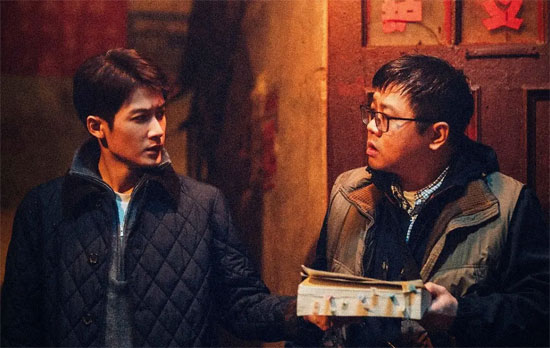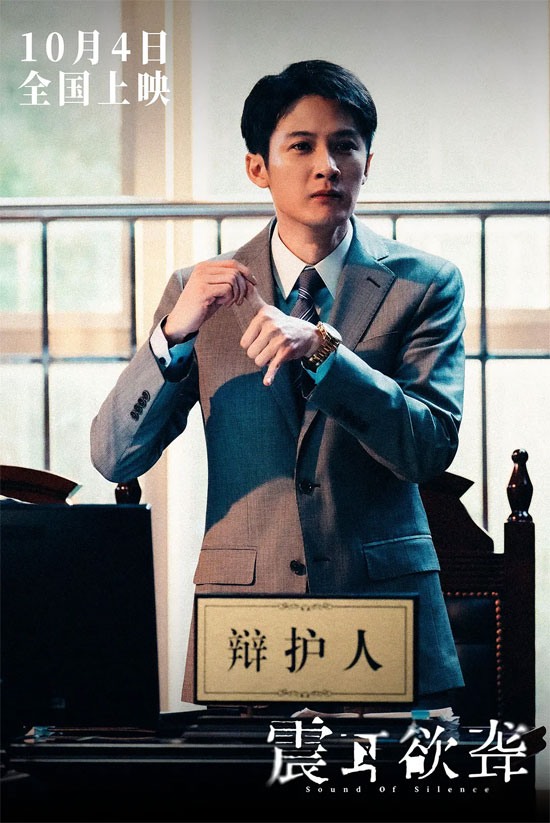Film Name: 震耳欲聋 / Sound of Silence
My earlier claim that “The Return of The Lame Hero” was likely the best film of the National Day holiday season was premature. After watching “Sound of Silence,” I realized there’s a true masterclass—while I enjoyed both films’ themes and subject matter, “Sound of Silence” stands out as the superior cinematic achievement.
Unlike many similar films that tackle niche subjects only to skim the surface with tired tropes, what I cherish most about this movie is how thoroughly it digests its subject matter and setting.

Simply put, the film follows CODA (Child of Deaf Adults) lawyer Li Qi as she advocates for the deaf community. It not only incorporates numerous details depicting the characteristics of deaf individuals and societal legal phenomena but also organically weaves these elements together. By intertwining “deafness” with the duality of “unable to hear words” and “unable to speak,” it achieves a profound elevation of its thematic narrative.
This approach seems straightforward yet proves challenging—few truly execute it well.
[Friendly reminder: Spoilers ahead.]
“Sound of Silence” is adapted from the true story of lawyer Zhang Qi, who successfully represented a group of deaf individuals in a lawsuit to reclaim their property. The film similarly centers its narrative around this case, focusing its storytelling on the protagonist Li Qi.

Li Qi is a character with a strong cinematic quality, possessing the complexity of protagonists in classic narratives.
On one hand, born into a deaf family and raised in the “Deaf Building,” his upbringing naturally shaped him into a CODA lawyer who connects with this marginalized community. Yet on the other, he desperately strives to shed the labels of belonging to a fringe group and being a “street lawyer,” yearning instead to become a “normal person” and rise above others.
This internal conflict and resistance make Li Qi’s class identity and labels strikingly clear: if an ordinary person struggles this much, what must life be like for those truly marginalized and vulnerable?
Li Qi’s best foil in “Sound of Silence” is the film’s main antagonist, Jin Songfeng (played with effortless ease by Wang Yanhui in this villainous role).

According to Jin Songfeng’s own account, his background mirrors Li Qi’s almost exactly—both had deaf-mute parents and grew up in harsh environments… But unlike Li Qi’s confusion and awkwardness, Jin Songfeng unapologetically embraces his role as a predator preying on the vulnerable.
Jin Songfeng knows this deaf-mute community intimately. They’re always one step behind in everything—even anti-fraud campaigns fail to reach them effectively. They’re universally starved for love and attention. To Jin Songfeng, a CODA who understands and can connect with them, this group represents the perfect prey.
“Sound of Silence” also highlights a harsh reality: while deaf-mutes and other disabled individuals have physical limitations, they possess the same human desires and emotions as anyone else—including the yearning for sudden wealth.
Take Aunt Wu, who lured many into the trap before taking her own life, or Aunt Pan, who blindly followed the scammers and suffered the worst losses—they are prime examples. Many assume people with disabilities only need basic care, not wealth or luxury. Yet the scammers understood their desires, creating the opening Jin Songfeng exploited.

This brings us to the greatest strength of “Sound of Silence,” as mentioned earlier: its successful elevation of “deafness” from a physical disability into a symbolic label representing hardship.
Many deaf individuals can actually speak, though they cannot hear… Yet precisely because they cannot hear sounds, they gradually lose the will to speak, slowly becoming “fully” deaf and mute.
In the film, hearing children like Li Qi from deaf families often become mute due to bullying. This is even more true for many genuinely deaf-mute individuals (and even ordinary people), who are forced into silence by environmental pressures—whether through coercion, temptation, or sheer indifference—thinking, “No one can hear me anyway.”
Within this context, the dramatic focus of “Sound of Silence” naturally centers on Li Qi’s decision and subsequent reversal.

While watching the film, I had a profound realization: “You must act according to who you truly are. You may deceive yourself for a time, but you cannot deceive yourself forever. Not everyone can maintain self-consistency after betraying their conscience.”
Li Qi is an ordinary man caught in a gray area, harboring both light and darkness within him: he possesses the chivalrous spirit to help siblings Zhang Xiaocheng and Zhang Xiaorui through their crisis, yet lacks sufficient motivation. However, when combined with legal fees and the recognition from his senior colleague and Director Dong, he finds the drive to act. Agreeing to Jin Songfeng’s terms and accepting hush money was certainly motivated by the desire for both fame and profit, but it was also the optimal solution under the existing difficult circumstances to win the lawsuit and secure maximum compensation.
Li Qi certainly had opportunities to suppress his conscience and join forces with the corrupt. Yet when Director Dong approached him, hoping he could persuade more deaf-mutes to come forward and sue Qihang Finance, Li Qi could only evade guiltily, unable even to put on a show or feign concern. At that moment, I understood he was destined never to be a “bad guy.”
In contrast, Assistant Tang is a true idealist. His presence serves to remind Li Qi and to underscore the film’s theme and the rule of law that society should uphold.

Deaf-mutes are a vulnerable group. They too possess greed, but does that justify defrauding and humiliating them? This society does indeed operate under a jungle law of survival of the fittest, but doesn’t this very reality demand we pursue fairness and justice?
The world may be this way, but it shouldn’t be.
There are no saviors in this world. Speaking up doesn’t guarantee solutions, but if we lose even the ability to voice our concerns, we become truly disabled…
So despite “Sound of Silence” ending on a slightly contrived and sentimental note, I still find it deeply compelling. After all, it uses silence to create a deafening roar.
Please specify:Anime Phone Cases » Sound of Silence 2025 Film Review: The “deaf-mute” symbolism is brilliantly captured!